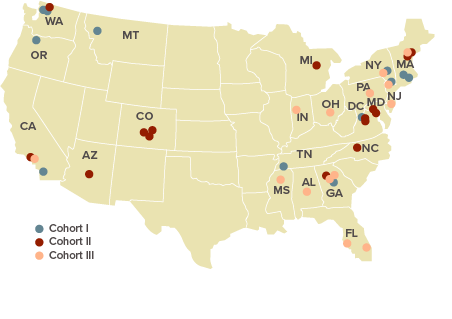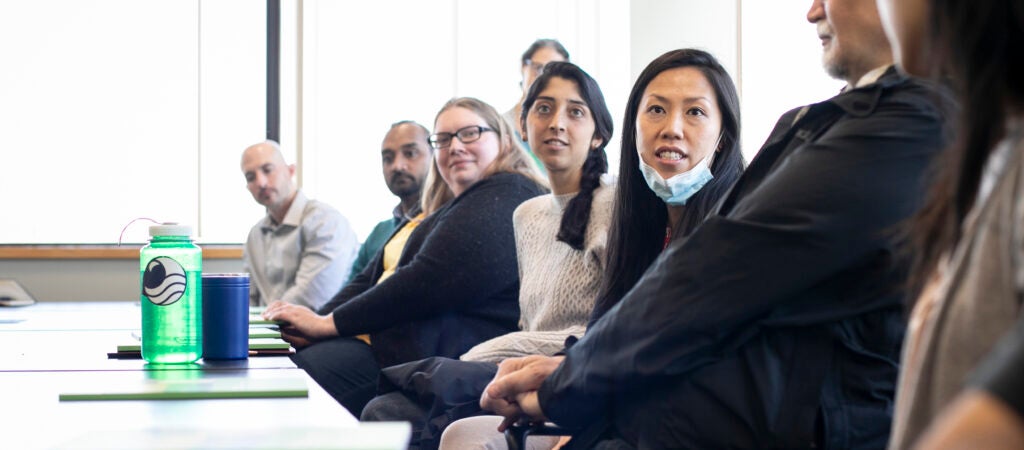“An innovative approach to support U.S. junior faculty engaged in research on the social and physical determinants of health inequities relevant to under-resourced communities.”
The JPB Foundation advances opportunity in the United States through transformational initiatives that empower those living in poverty, enrich and sustain our environment, and enable pioneering medical research. With support from the JPB Foundation, the JPB Environmental Health Fellowship Program was established in 2014. This innovative program aims to advance the careers of compassionate, socially aware junior faculty and federal agency research scientists to solve complex environmental health problems.
Our Mission
To train and support compassionate and rigorous scholars who conduct work that both produces knowledge about the social and environmental factors that affect health and health equity but also points to or develops solutions for increasing health equity.
The JPB EH Fellowship Program was the first national program to focus on curating the professional development of junior faculty committed to social and environmental justice. The Program fosters cross-disciplinary collaborations and encourages Fellows to work together on challenging environmental health issues best approached from multiple perspectives. The program facilitates the development of a hybrid discipline that examines the combined influence of both the physical and the social determinants on health. Along with mentorship, the Fellowship provides training in research design/proposal development, communications and leadership as well as funding up to $250,000 over the course of a three and a half year period.
The Award
The JPB Environmental Health Fellowship Award includes funding that ranges between $50,000 to $250,000 over 3.5-years. Through an internal grant process, funding is awarded for research projects and participation in the program’s activities. Fellows receive mentoring and training on proposal development/writing, leadership, communications and professional development.
Details
- Up to $50,000 ( for 30% salary support and workshop travel ) in year 1
- Up to $100,000 annually ( for approved research projects, training & participation in program activities) in years 2 and 3
- Two one-week long workshops annually for training and career development
- Academic training in multidisciplinary research, scholarship, proposal development, leadership and communications
- Mentorship to enhance existing expertise and to expand scholarship into novel domain
Unlike other fellowship programs, the JPB Environmental Health Fellows remain at their home institution. These home institutions demonstrate their commitment to the Fellows by allowing release time from teaching and other activities in order to attend workshops and monthly conference (video/telephone) meetings. Home institutions also have provided additional support for the Fellows in ways that include, but are not limited to, scholarships for graduate students or postdocs, and/or the purchase of equipment, software or sample analysis.
Our Fellows

A Diversity of Disciplines
Fellows come from disciplines related to Environmental Health and Social and Behavioral Health such as Epidemiology, Exposure Sciences, Engineering and Physical and Biological Sciences. Engineering, Environmental Health [exposure science, epidemiology], Medicine, Economics, Architecture, Geographic, Geological and Biological Sciences
Early Career Faculty
Fellows are junior faculty (in their first appointment period) working in under-resourced communities on Social and Environmental Health research as it relates to health disparities
Federal Agency Research Scientists
Unique to the program is the inclusion of Senior Research Scientists from Federal Agencies. Although not eligible for funding, these researchers participate in the training programs, and compliment research project development. Together both the faculty and agency Fellows are valuable resources for each other.
Collaborative Researchers
Fellows are compassionate individuals with a particular commitment to scholarship, creativity and they possess an openness to new ideas and collaborative research aimed at mitigating environmental and social disparities in health.
Change Agents
Fellows are academic and government leaders who are focused on solutions. Through internal grants, mentoring, and training will be well prepared to engage in community-based research addressing persistent and emerging environmental health challenges across the U.S
